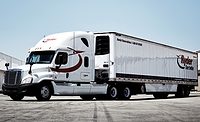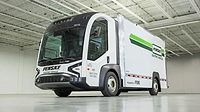Considerations for leasing vs. buying
Beverage fleets weigh the cost of money

During the last several years of working with beverage fleet managers, few topics have shown a solid division between strategy and practice. While the wide variation of operations in the industry does foster a diversity of thought, it’s rare to find a topic on which managers are diametrically opposed. Leasing is one such topic. The number of fleets that lease 100 percent of their trucks is not much different than the ones that do not lease any of their trucks.
Drilling down a bit, one will find that among the largest distributors, those grossing more than $40 million a year, more than half of that group leases at least part of their fleets, and more than 20 percent leases 100 percent of their fleets. There is a good reason for this: The biggest operations have become big and stayed big by directing their efforts, attention and capital to the beverage business while leaving their trucks to the experts in the trucking business.
It’s not a question of the bigger fleets being more able to afford leasing. On the contrary, the bigger fleets have learned through time and experience that they can’t afford not to lease.
When it comes to capital expenditures, one maxim has long applied: Buy anything that appreciates, lease anything that depreciates. Although there may be some gray areas on the appreciation/depreciation scale, such as real estate during the last few years, there is virtually no scenario in which trucks and other rolling stock will appreciate.
Still, many fleet managers will object to leasing, typically citing cost as a factor. The problem with this objection is that it only considers the up-front cost, not the total life-cycle cost of the asset.
When looking at the true total cost of an asset that depreciates, leasing is rarely more expensive than an outright purchase.
Even if a fleet has considered total life-cycle cost, some managers still will object to leasing on the basis that they should be able to save the portion of the cost that goes to the leasing company’s profit by administering the acquisition, financing, maintenance and disposal of fleet assets themselves. This logic ignores economies of scale on several levels.
With the exception of just a few of the largest bottlers, few fleets are able to match the economies of scale available to a major leasing company.
First and foremost among these economies of scale is the cost of capital. Even the largest regional distributor is unlikely to have access to capital at rates as low as that available to a major leasing company. Major leasing companies can offer capital at a cost lower than the best rates available to a fleet for purchase, while still earning a portion of their profits from that competitive rate.
PacLease, the division of Bellevue, Wash.-based Paccar, which is the parent company of the Kenworth and Peterbilt brands, is one leasing company with access to capital at a very low cost. “With 74 straight years of posting a net profit and dividends paid every year since 1941, Paccar has an A+/A1 credit rating, one of the highest credit ratings in the automotive industry,” says Chris Maccio, director of sales at PacLease. This affords the company access to capital at rates lower than those available to many governmental entities, especially in the current economic environment.
Another economy of scale, somewhat more obvious, is purchasing power. Even the largest bottlers are unlikely to match the annual purchasing volume of a major leasing company. Just as better prices can be negotiated for buying 20 trucks instead of two, the price gets better when you buy 20,000 trucks. In addition to price breaks for volume, an original equipment manufacturer leasing company can enjoy a bit of a “family” discount. Here again, this means that the leasing company can offer a competitive asset price while still earning its profit and lowering the fleet’s total cost.
Yet another economy of scale comes into play with full-service leasing, where maintenance costs are built in to the monthly lease payment. In addition to relieving the fleet manager of the headaches that come with maintenance and establishing a fixed cost for typically cyclical maintenance expenses, the leasing company has access to parts, supplies, well-trained technicians, and many other elements of a maintenance program at deeply discounted pricing due to volume buying.
Full-service leasing also will typically provide a replacement truck when the leased unit is down for service or repairs. Although not specifically an economy of scale, this benefit of a full-service lease eliminates the need for owning a “spare” truck, something that would be cost-prohibitive for the smallest fleets.
Looking for a reprint of this article?
From high-res PDFs to custom plaques, order your copy today!







